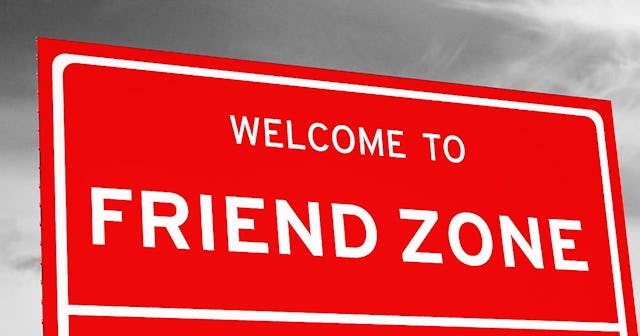The Concept Of The 'Friend Zone' Is Toxic AF

It’s funny how we can get so used to a social concept that we neglect to notice it’s toxic AF. Like a man asking a woman’s father for her hand in marriage, as if the woman herself has no agency, or like telling a woman who’s frustrated her husband isn’t pulling his weight around the house, Well, why don’t you just ask for help? Or like men telling women to smile, as if we are decorations on a shelf. We’ve come a long way, but the patriarchy runs deep, and we’re still accepting a lot of bullshit double standards as normal.
Take, for example, the concept of the “friend zone.” I’m not sure when I first heard this phrase used to explain the status of a man who is unable to win the affections of his love interest and, as some kind of sad consolation prize, is thrust into the dreaded zone of friendliness. The horror. It feels like this phrase has always been there, and to be honest it wasn’t until I came across a TikTok video a little while ago that it occurred to me that the idea is toxic.
In the clip above, comedian Alex Falcone breaks down why he’s sick of the term “friend zone.” “Yeah, what you’re saying is, you pretended to be nice to her, and she didn’t sleep with you,” he says. “And so you’re the victim of a huge injustice!”
I’m a little embarrassed that despite considering myself a raging feminist, I never thought of this term that way. To me, “friend zone” was simply a tongue-in-cheek way of describing rejection. And I think many people probably do still think of it that way. I’m sure I’ll get lots of “Oh, for fuck’s sake, do we have to overanalyze everything these days, ugh, why does this even need to be a whole article” type comments in response to what I’ve written here.
But this is a topic worth discussing, especially in today’s climate where we’re unpacking so much of the aforementioned ingrained toxic behavior that we’ve previously taken for granted.
Let’s be real, though — rejection sucks. No one would deny that unrequited love is a straight-up dagger to the heart. But the problem with “friend zone” rhetoric is two-fold. First, it implies manipulation on the part of the man. He was nice to a woman with the expectation of a specific outcome that would meet his needs. When that hoped-for outcome was not granted, the woman to whom he had previously presented the idea of a friendly relationship is now viewed with negativity, and the man is viewed as a loser/victim in a game that he initiated.
Second, as Falcone so aptly pointed out in his TikTok video: “What kind of monster is mad about getting a friend?”
Ironically, the term “friend zone” came from the megahit ‘90s TV show, “Friends.” In season 1, in the episode, “The One with the Blackout,” Joey tells Ross, who has a secret crush on Rachel, “You waited too long to make your move, and now you’re in the friend zone.”
The term spread and in 2003 was added to the Urban Dictionary, described as “What you attain after you fail to impress a woman you’re attracted to.” In 2012, “friend zone” began making the rounds on Reddit and other popular sites, with some conversations focused on how “nice guys” can get out of the friend zone, and other conversations pointing out the problematic nature of the concept right off the bat. A Morpheus meme circulated, with that iconic image of Morpheus from “The Matrix” with his reflective Matrix-y sunglasses, with text that reads, “What if I told you friendzoning is bullshit because girls are not machines that you put kindness coins into and sex falls out.”
Where is the lie?
There are so many pieces of culture that leave the managing of men’s behavior, and the care of men’s egos, to women. From dress codes to how to say no without bruising a man’s fragile ego, the onus is far too often on the women to do the emotional heavy lifting (not to mention keeping ourselves safe, since one can’t predict how a man who’s had his ego damaged will react). It should bother us all that it is apparently incumbent upon women to constantly coddle men’s feelings while at the same time men are not allowed to have any.
No one should be made to feel guilty, as if they’ve intentionally harmed someone, because they made a decision for themselves that didn’t align with the hopes of a romantic pursuer. A woman should not be made to feel as though her friendship is only valuable if it comes with the promise of eventual sex. And a man sure as hell shouldn’t accept “friend zone” status with the expectation that he will eventually “level up.” Friendship isn’t a weapon to manipulate a woman into a sexual relationship.
So let’s stop talking like it is.
This article was originally published on